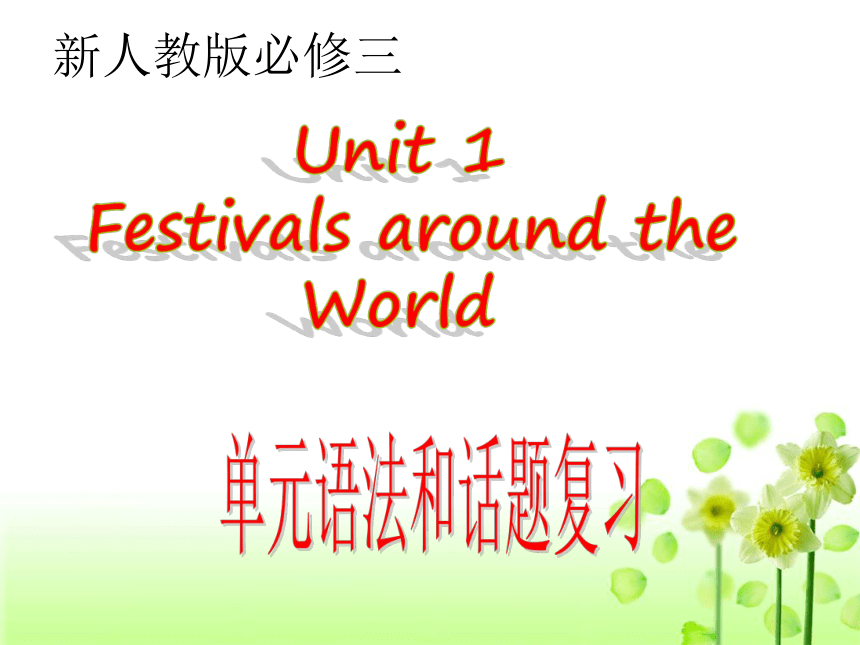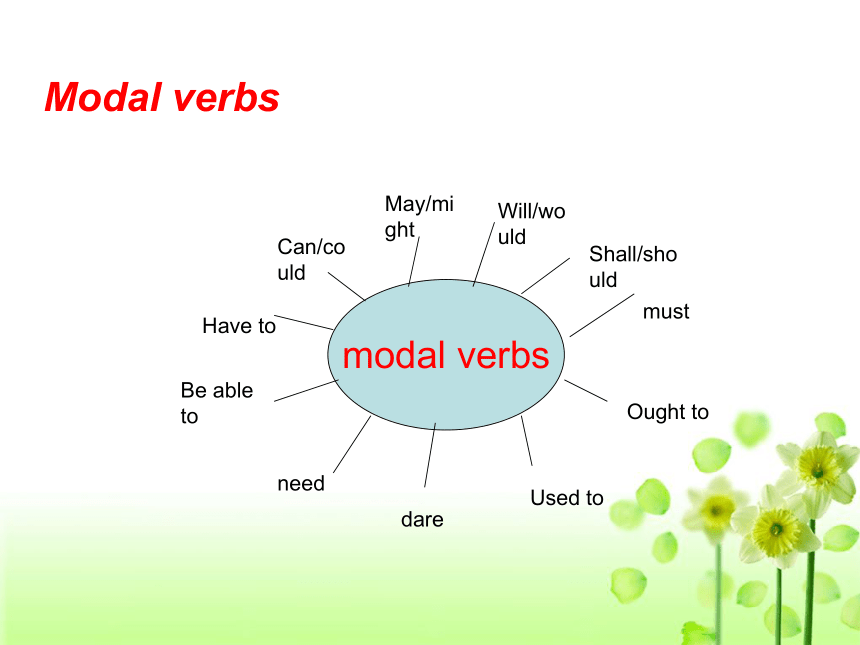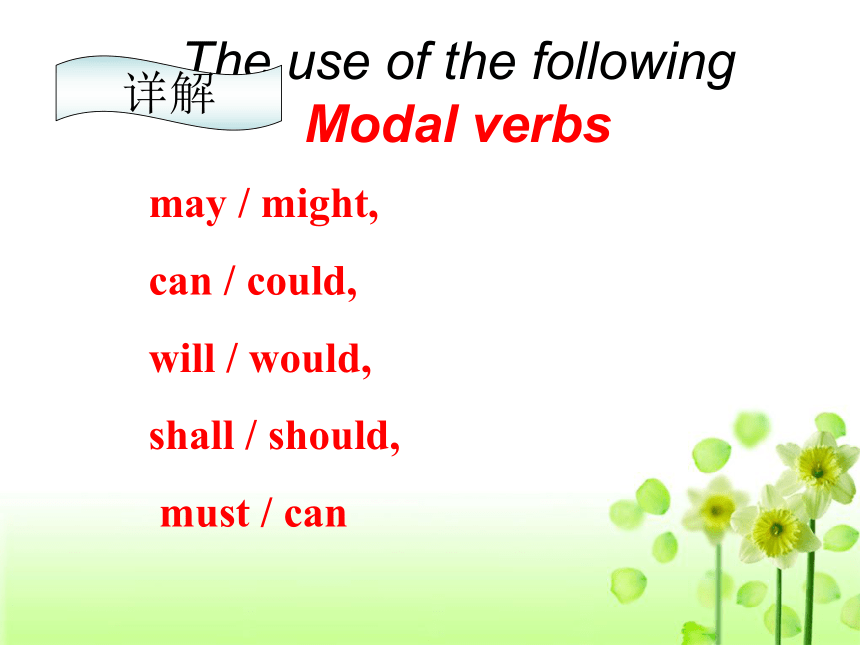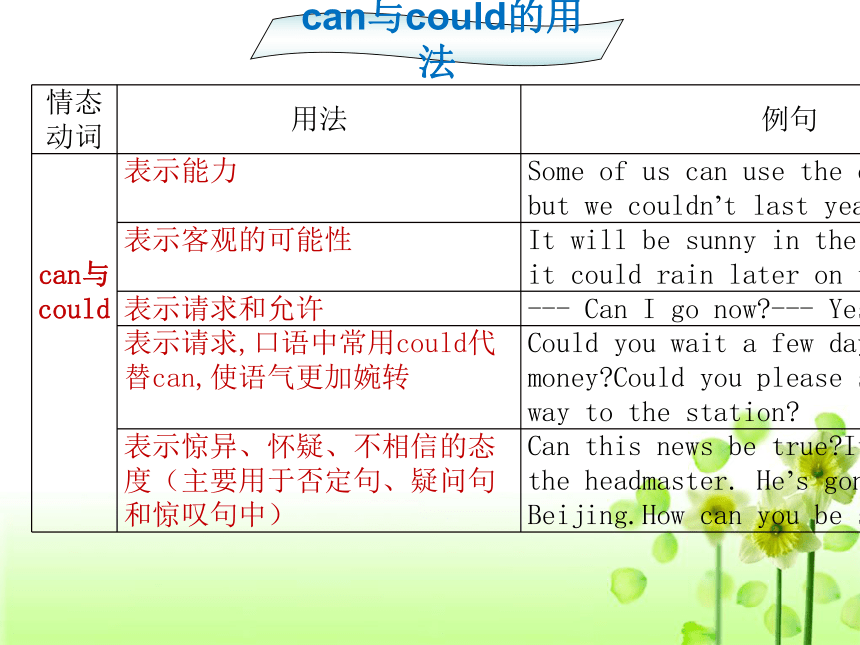人教版必修三单元语法和话题复习Unit1- Fetivals around the World 课件 共29张PPT
文档属性
| 名称 | 人教版必修三单元语法和话题复习Unit1- Fetivals around the World 课件 共29张PPT |  | |
| 格式 | zip | ||
| 文件大小 | 719.5KB | ||
| 资源类型 | 教案 | ||
| 版本资源 | 人教版(新课程标准) | ||
| 科目 | 英语 | ||
| 更新时间 | 2020-02-20 21:45:58 | ||
图片预览









文档简介
(共29张PPT)
1
新人教版必修三
情态动词的语法特征
1.情态动词有一定的意义,表示或暗示某种情绪或态度,表示可能、建议、愿望、必要、允许、能力等。
2. 情态动词没有人称和数的变化,即不随主语的不同而变化。
3. 情态动词不能独立使用,必须和实义动词一起构成谓语。
4. 情态动词除ought和have外,后面只能接不带to的 不定式。
5. ?情态动词没有非谓语形式,即没有不定式、分词等形式。
综述
Modal verbs
modal verbs
Can/could
May/might
Will/would
Shall/should
must
Ought to
Used to
dare
Be able to
need
Have to
may / might,
can / could,
will / would,
shall / should,
must / can
The use of the following
Modal verbs
详解
may 与might的用法
情态动词 用法 例句
may与might 表示允许、许可。否定答语一般要用mustn’t,表示“禁止、阻止”之意。 --- May I watch TV after supper?--- Yes, you may. / No, you mustn’t.
在表示请求、允许时, might比 may的语气更委婉一些。在日常口语中,用can征询对方意见更为常见。 ---Might I use your telephone?--- Yes, please.--- May / Can I go home now?--- Yes, you may / can.
表示可能性的推测,含有“或许”“大概”“可能”之意,用might代替may时,则语气显得更加不肯定。 What he said may be true.She may come tomorrow.He might have some fever.
can与could的用法
情态动词 用法 例句
can与could 表示能力 Some of us can use the computer now, but we couldn’t last year.
表示客观的可能性 It will be sunny in the daytime, but it could rain later on this evening.
表示请求和允许 --- Can I go now?--- Yes, you can.
表示请求,口语中常用could代替can,使语气更加婉转 Could you wait a few day for the money?Could you please show me the way to the station?
表示惊异、怀疑、不相信的态度(主要用于否定句、疑问句和惊叹句中) Can this news be true?It can’t be the headmaster. He’s gone to Beijing.How can you be so foolish!
will与would的用法
情态动词 用法 例句
will与would
用于表示意志或意愿。Will指现在,would指过去 I will never do that again.They said that they would help us.
表示请求、建议等,用would比用 will委婉、客气些 Will you please take a message for me?Would you please pass him the book?
表示习惯性动作,译为“总是”“惯于”。Will指现在,would指过去 Fish will die without water.Every evening, she would sit by the window, deep in thought.
表示预料或猜想 It would be about ten when he left home. I thought he would have told you about that.
用于否定句中,表示“不肯”“不乐意” No matter what I said, he wouldn’t listen to me.
.shall与should的用法
情态动词 用法 例句
shall
should
用于第一、第三人称疑问句中,表示说话人征求对方的意见 What shall we do next?Shall I do the washing-up?When shall my brother be able to leave hospital?
用于第二、第三人称的陈述句中,表示说话人给对方的命令、警告、允诺或威胁 You shall go with me. ( 命令)You shall have a new dress for your birthday.(允诺)He shall be punished.(威胁)
表示劝告或建议,作“应该”讲 We should be strict with ourselves.You should keep your promise.
表示推测,作“可能”、“该”讲 The roads should be less crowded today. I should have finished reading it by Friday.
Why / how + should结构表示说话人对谋事不能理解、感到惊异等意思,译为“竟会” Why should you be so late today?(你今天怎么来的这么晚?)I don’t know why you should think that I did it.(我真不明白你凭什么认为这件事是我干的。)
must, may (might) 和can表示“推测”的用法
情态动词 用法 例句
must 只能用于肯定句,表示可能性很大的一种推测,作“肯定”“一定”讲 (1)--- Look, someone is coming. Who can it be? --- It may be the headmaster. ---It can’t be him. He has gone to Shanghai. --- Then it must be Mr Zhang. He looks like the headmaster.(2)--- What can they be talking about? --- They may / must be talking about the question raised at the meeting.(3) --- Can they have finished the work? --- Yes, they may / must have finished it. --- No, they can’t have finished the work so soon. --- Then they must have played so much.
May /might 用于肯定句中(可能,或许,大概);用于否定句中(可能不)。表示可能性较小的一种推测
can 表示推测时,只用于否定句和疑问句中
本单元的中心话题是"节日及节假日活动"。节日及节假日活动是指春节、元旦、国庆节、植树节、教师节、重阳节、圣诞节、复活节、情人节、母亲节等各种中西方节假日的起源、发展、庆祝方式和假日活动安排,还有生日、周年纪念日、毕业典礼等各种庆祝活动,以及参加这些活动的经历和感受等。暑期、寒假等的活动、社会实践活动或者青年志愿者的活动安排及感受等等。
话题综述
一、中国节日名称
1.The Spring Festival春节
2.The Dragon Boat Festival端午节
3.The Mid-autumn Festival中秋节
4.New Year’s Day元旦
5.National Day国庆节
6.International Labor Day五一劳动节
话题词汇
7.Teachers’ Day教师节
8.Children’s Day儿童节
9.Women’s Day妇女节
10.Tomb-sweeping Day清明节
11.Double Ninth Festival重阳节
12.Lantern Festival元宵节
二、西方节日名称
1. Christmas day 圣诞节
2.Thanksgiving Day 感恩节
3. Valentine’s Day 情人节
4.April Fool’s Day 愚人节
5.Halloween Day 万圣节
6.Easter Day 复活节
7.Mothers’ Day 母亲节
8.Fathers’ day 父亲节
三、常用词汇
1.celebrate庆祝
2.observe遵守,庆祝
3.congratulation祝贺
4.in honor of为了庆祝
5.approach靠近
6.paradise游行
7.celebration庆祝活动
8.feast盛宴
9.popularity受欢迎
10.on holiday度假
11.ask for leave请假
12. cradle of culture文化摇篮
13. traditional culture传统文化
14. artistic taste艺术品味
15. stick to the tradition坚持传统
16. cultural needs文化需求
17. give publicity to…宣传… 广受欢迎
18. enjoy great popularity 16. cultural treasures文化宝藏
19. historical site古迹
20. material civilization物质文明
21.fall on恰逢
四、参考语句 话题常用句型?
1. National Day is coming. 国庆节快到了。
2. National Day falls on Monday this year.今年国庆节是星期一。
3. We celebrated the New Year with a dance party. 我们举行舞会来庆祝新年。
4. It is festivals that make us reunite .节日让我们团聚在一起。
话题句型
5. People all enjoy ourselves.人们都很欢乐。
6. I can have a rest, and put trouble aside.我可以好好休息一下,把烦恼丢到一边。
7. Celebrating festivals is a good way to hand down the tradition .庆祝节日是传承传统的好方法。
8.I love all festivals, because people?usually feel happy during festivals anyway.我喜欢所有节日,因为,无论怎样,人们在节日里总是感到快乐的.
9. Spring Festival is the most important festival in China, and it is also my most favor festival.春节是中国最重要的节日,也是我最喜欢的节日.
10.It’s to celebrate the lunar calendar’s new year.它是为了庆祝农历新年?
11.In the evening before the Spring Festival, families get together and have a big meal.
在春节前夜,家人聚在一起享用丰盛的一餐?
12.In many places people like to set off firecrackers .在许多地方人们还放鞭炮?
13.Dumplings are the most traditional food.饺子是最传统的食物?
14.The 9th day of the 9th lunar month is the traditional Chongyang Festival农历九月初九是传统的重阳节。
15. The custom of ascending a height to avoid epidemics was passed down from long time ago.登高避疫的习俗是很久以前流传下来的。
(2019年新课标全国卷III)假定你是李华,你校将举办音乐节。请写封邮件邀请你的英国朋友Allen参加,内容包括:
1.时间; 2.活动安排; 3.欢迎他表演节目。
注意:
1.词数100左右;2.可以适当增加细节,以使行文连贯。
话题典例
【参考范文】
Dear Allen,
How is everything going? Our school will hold a music festival next Sunday morning in the school hall. And I’m writing to invite you to join us.
【参考范文】
The opening ceremony will start at 9:00 am, and the schoolmaster will deliver a speech. Then there will be various fantastic performances played by talented students.
You are definitely welcome to show up on stage, which will add color and fun to our festival.
Looking forward to your early reply.
Best wishes,
Li Hua
Thank you very much
*
1
新人教版必修三
情态动词的语法特征
1.情态动词有一定的意义,表示或暗示某种情绪或态度,表示可能、建议、愿望、必要、允许、能力等。
2. 情态动词没有人称和数的变化,即不随主语的不同而变化。
3. 情态动词不能独立使用,必须和实义动词一起构成谓语。
4. 情态动词除ought和have外,后面只能接不带to的 不定式。
5. ?情态动词没有非谓语形式,即没有不定式、分词等形式。
综述
Modal verbs
modal verbs
Can/could
May/might
Will/would
Shall/should
must
Ought to
Used to
dare
Be able to
need
Have to
may / might,
can / could,
will / would,
shall / should,
must / can
The use of the following
Modal verbs
详解
may 与might的用法
情态动词 用法 例句
may与might 表示允许、许可。否定答语一般要用mustn’t,表示“禁止、阻止”之意。 --- May I watch TV after supper?--- Yes, you may. / No, you mustn’t.
在表示请求、允许时, might比 may的语气更委婉一些。在日常口语中,用can征询对方意见更为常见。 ---Might I use your telephone?--- Yes, please.--- May / Can I go home now?--- Yes, you may / can.
表示可能性的推测,含有“或许”“大概”“可能”之意,用might代替may时,则语气显得更加不肯定。 What he said may be true.She may come tomorrow.He might have some fever.
can与could的用法
情态动词 用法 例句
can与could 表示能力 Some of us can use the computer now, but we couldn’t last year.
表示客观的可能性 It will be sunny in the daytime, but it could rain later on this evening.
表示请求和允许 --- Can I go now?--- Yes, you can.
表示请求,口语中常用could代替can,使语气更加婉转 Could you wait a few day for the money?Could you please show me the way to the station?
表示惊异、怀疑、不相信的态度(主要用于否定句、疑问句和惊叹句中) Can this news be true?It can’t be the headmaster. He’s gone to Beijing.How can you be so foolish!
will与would的用法
情态动词 用法 例句
will与would
用于表示意志或意愿。Will指现在,would指过去 I will never do that again.They said that they would help us.
表示请求、建议等,用would比用 will委婉、客气些 Will you please take a message for me?Would you please pass him the book?
表示习惯性动作,译为“总是”“惯于”。Will指现在,would指过去 Fish will die without water.Every evening, she would sit by the window, deep in thought.
表示预料或猜想 It would be about ten when he left home. I thought he would have told you about that.
用于否定句中,表示“不肯”“不乐意” No matter what I said, he wouldn’t listen to me.
.shall与should的用法
情态动词 用法 例句
shall
should
用于第一、第三人称疑问句中,表示说话人征求对方的意见 What shall we do next?Shall I do the washing-up?When shall my brother be able to leave hospital?
用于第二、第三人称的陈述句中,表示说话人给对方的命令、警告、允诺或威胁 You shall go with me. ( 命令)You shall have a new dress for your birthday.(允诺)He shall be punished.(威胁)
表示劝告或建议,作“应该”讲 We should be strict with ourselves.You should keep your promise.
表示推测,作“可能”、“该”讲 The roads should be less crowded today. I should have finished reading it by Friday.
Why / how + should结构表示说话人对谋事不能理解、感到惊异等意思,译为“竟会” Why should you be so late today?(你今天怎么来的这么晚?)I don’t know why you should think that I did it.(我真不明白你凭什么认为这件事是我干的。)
must, may (might) 和can表示“推测”的用法
情态动词 用法 例句
must 只能用于肯定句,表示可能性很大的一种推测,作“肯定”“一定”讲 (1)--- Look, someone is coming. Who can it be? --- It may be the headmaster. ---It can’t be him. He has gone to Shanghai. --- Then it must be Mr Zhang. He looks like the headmaster.(2)--- What can they be talking about? --- They may / must be talking about the question raised at the meeting.(3) --- Can they have finished the work? --- Yes, they may / must have finished it. --- No, they can’t have finished the work so soon. --- Then they must have played so much.
May /might 用于肯定句中(可能,或许,大概);用于否定句中(可能不)。表示可能性较小的一种推测
can 表示推测时,只用于否定句和疑问句中
本单元的中心话题是"节日及节假日活动"。节日及节假日活动是指春节、元旦、国庆节、植树节、教师节、重阳节、圣诞节、复活节、情人节、母亲节等各种中西方节假日的起源、发展、庆祝方式和假日活动安排,还有生日、周年纪念日、毕业典礼等各种庆祝活动,以及参加这些活动的经历和感受等。暑期、寒假等的活动、社会实践活动或者青年志愿者的活动安排及感受等等。
话题综述
一、中国节日名称
1.The Spring Festival春节
2.The Dragon Boat Festival端午节
3.The Mid-autumn Festival中秋节
4.New Year’s Day元旦
5.National Day国庆节
6.International Labor Day五一劳动节
话题词汇
7.Teachers’ Day教师节
8.Children’s Day儿童节
9.Women’s Day妇女节
10.Tomb-sweeping Day清明节
11.Double Ninth Festival重阳节
12.Lantern Festival元宵节
二、西方节日名称
1. Christmas day 圣诞节
2.Thanksgiving Day 感恩节
3. Valentine’s Day 情人节
4.April Fool’s Day 愚人节
5.Halloween Day 万圣节
6.Easter Day 复活节
7.Mothers’ Day 母亲节
8.Fathers’ day 父亲节
三、常用词汇
1.celebrate庆祝
2.observe遵守,庆祝
3.congratulation祝贺
4.in honor of为了庆祝
5.approach靠近
6.paradise游行
7.celebration庆祝活动
8.feast盛宴
9.popularity受欢迎
10.on holiday度假
11.ask for leave请假
12. cradle of culture文化摇篮
13. traditional culture传统文化
14. artistic taste艺术品味
15. stick to the tradition坚持传统
16. cultural needs文化需求
17. give publicity to…宣传… 广受欢迎
18. enjoy great popularity 16. cultural treasures文化宝藏
19. historical site古迹
20. material civilization物质文明
21.fall on恰逢
四、参考语句 话题常用句型?
1. National Day is coming. 国庆节快到了。
2. National Day falls on Monday this year.今年国庆节是星期一。
3. We celebrated the New Year with a dance party. 我们举行舞会来庆祝新年。
4. It is festivals that make us reunite .节日让我们团聚在一起。
话题句型
5. People all enjoy ourselves.人们都很欢乐。
6. I can have a rest, and put trouble aside.我可以好好休息一下,把烦恼丢到一边。
7. Celebrating festivals is a good way to hand down the tradition .庆祝节日是传承传统的好方法。
8.I love all festivals, because people?usually feel happy during festivals anyway.我喜欢所有节日,因为,无论怎样,人们在节日里总是感到快乐的.
9. Spring Festival is the most important festival in China, and it is also my most favor festival.春节是中国最重要的节日,也是我最喜欢的节日.
10.It’s to celebrate the lunar calendar’s new year.它是为了庆祝农历新年?
11.In the evening before the Spring Festival, families get together and have a big meal.
在春节前夜,家人聚在一起享用丰盛的一餐?
12.In many places people like to set off firecrackers .在许多地方人们还放鞭炮?
13.Dumplings are the most traditional food.饺子是最传统的食物?
14.The 9th day of the 9th lunar month is the traditional Chongyang Festival农历九月初九是传统的重阳节。
15. The custom of ascending a height to avoid epidemics was passed down from long time ago.登高避疫的习俗是很久以前流传下来的。
(2019年新课标全国卷III)假定你是李华,你校将举办音乐节。请写封邮件邀请你的英国朋友Allen参加,内容包括:
1.时间; 2.活动安排; 3.欢迎他表演节目。
注意:
1.词数100左右;2.可以适当增加细节,以使行文连贯。
话题典例
【参考范文】
Dear Allen,
How is everything going? Our school will hold a music festival next Sunday morning in the school hall. And I’m writing to invite you to join us.
【参考范文】
The opening ceremony will start at 9:00 am, and the schoolmaster will deliver a speech. Then there will be various fantastic performances played by talented students.
You are definitely welcome to show up on stage, which will add color and fun to our festival.
Looking forward to your early reply.
Best wishes,
Li Hua
Thank you very much
*
同课章节目录
